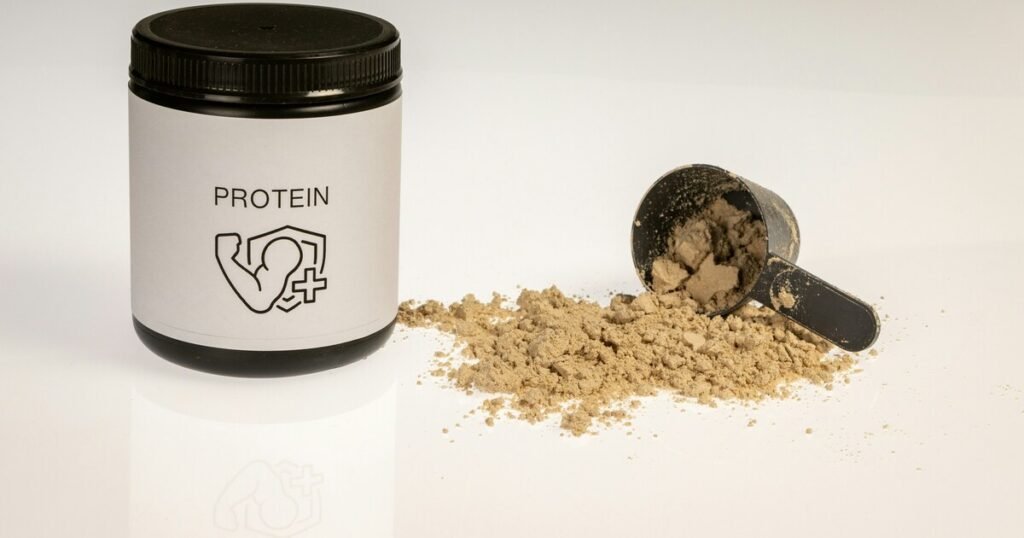We independently test and review fitness products using a research-based approach. If you buy through our links, we may earn a small commission at no extra cost to you. Read our Disclosure
Embarking on a strength-training journey from the comfort of your home can be both exciting and challenging. While selecting the right workout routine often gets much attention, the importance of a well-crafted nutrition plan is sometimes overlooked.
Fueling your body with the right nutrients is key to achieving those strength goals. From macronutrients that power your workouts to micronutrients that aid recovery, every bite counts when you’re building muscle and strength at home.
Whether you’re a beginner or a seasoned fitness enthusiast, understanding how nutrition synergizes with your workout routine is crucial. With the right dietary choices, you can maximize your gains and ensure that your body remains strong, healthy, and ready for the next session.
Get ready to delve into the essentials of nutrition tailored specifically for at-home strength training. Let’s explore how you can effectively feed your fitness ambitions right from your kitchen!
Nutrition Essentials for Home Strength Training
While intensity and consistency in workouts are vital, nutrition has an equally pivotal role in your fitness success at home. The foundation lies in understanding the balance of macronutrients: proteins, carbohydrates, and fats.
Protein Power
Proteins are your muscles’ primary building blocks, making them essential for repair and growth. Incorporate lean sources like chicken, fish, tofu, and legumes into your meals. Aim for a mix of animal and plant-based proteins to diversify your nutrient intake.
Carb Choices
Carbohydrates are your main energy source during workouts. Opt for complex carbs such as whole grains, sweet potatoes, and quinoa to provide sustained energy. These will help you power through even the toughest home sessions.
Healthy fats, found in avocados, nuts, and olive oil, play a crucial role in hormone regulation and cell health. Don’t shy away from fats; they are essential for absorbing vitamins and supporting overall wellness.
Hydration is often underestimated but vital for optimal performance. Water keeps your muscles hydrated, your joints lubricated, and your concentration sharp. Make sure to sip throughout the day and not just around workout time.
By prioritizing these nutritional elements, your at-home strength training efforts can translate into noticeable results and lasting health benefits.
Optimal Macronutrient Balance for Muscle Building
Finding the right balance of macronutrients is like finding the perfect recipe for success in your home strength training journey. Each macronutrient plays a distinct role in muscle growth and energy provision.
Protein Priority
To build muscle, your body needs an adequate supply of protein. Aim for about 1.2 to 2.2 grams of protein per kilogram of body weight. This range allows you to tailor your intake according to your specific muscle-building goals and activity levels.
Carbohydrates are your ally for optimizing workout performance and recovery. They replenish glycogen stores, providing energy for muscle contractions. Aiming for about 45-60% of your total daily calorie intake from carbs ensures your muscles get the fuel they crave.
For fats, focus on high-quality sources, keeping your intake to about 20-35% of your total daily calories. Not only are healthy fats a concentrated energy source, but they also support essential bodily functions, including nutrient absorption.
Tweak these ratios based on how your body responds to your training regimen. As you progress and your strength goals evolve, your macronutrient needs may shift, requiring small adjustments to ensure ongoing muscle growth and optimal performance.
Pre-Workout Fueling Strategies
Nailing your pre-workout nutrition can make all the difference in your performance and results. Eating the right foods at the right time fuels your body, boosts endurance, and enhances focus.
Timing is crucial. Aim to eat a balanced meal with carbs and protein 2-3 hours before your workout. This will provide your muscles with the necessary glycogen stores and amino acids for optimal strength training performance.
Quick Energy Boost
If you’re crunched for time, a small snack 30-60 minutes before exercising can also do the trick. Opt for easily digestible options like a banana with a spoonful of peanut butter or a small smoothie. These choices deliver quick energy without weighing you down.
Hydration can’t be overlooked. Ensure you’re well-hydrated by sipping water consistently throughout the day. A glass or two of water about 30 minutes before you start will help maintain fluid balance and prevent fatigue.
By tailoring your pre-workout nutrition to your schedule and preferences, you can effectively set the stage for a more productive and enjoyable strength training session at home. Remember, the right fuel can transform a good workout into a great one!
Post-Workout Nutrition Importance
Once you’ve powered through your home strength training session, it’s time to focus on recovery. Post-workout nutrition is key to replenishing energy, repairing muscle, and reducing fatigue.
Within 30 to 60 minutes after your workout, aim to consume a meal or snack rich in both carbohydrates and protein. This time window optimizes glycogen replenishment and jumpstarts muscle repair.
Repair and Rebuild
Protein remains vital post-exercise. Consuming 20-30 grams of protein aids muscle recovery, providing the necessary building blocks for repair and growth. Think grilled chicken with quinoa, a protein shake, or Greek yogurt with berries.
Carbs play an essential role too, helping restore glycogen levels depleted during exercise. Whole grain toast with a nut spread, or a fruit smoothie, can be excellent choices to refuel efficiently.
Don’t forget to rehydrate. Replenishing fluids lost through sweat is crucial for recovery. Water or an electrolyte-rich drink can help maintain fluid balance and support overall well-being.
Your post-workout routine shouldn’t be an afterthought. Focusing on these nutritional strategies ensures your body gets the support it needs to grow stronger and ready for your next session.
Hydration Tips for Enhanced Performance
Proper hydration is a game-changer when it comes to optimizing your home strength training regimen. Staying well-hydrated ensures your muscles function efficiently and improvement is maximized.
Start your day with a glass of water to kickstart your hydration. Water intake should be consistent and not just limited to before or after workouts. Sip steadily throughout the day to keep your fluid levels balanced.
Monitor your individual hydration needs. Factors like workout intensity, duration, and ambient room temperature can affect how much fluid you should consume. Pay attention to your body’s signals, such as thirst and the color of your urine, as gauges of your hydration status.
During workouts, take regular sips, especially if your session extends beyond an hour or involves intense exertion. This practice helps maintain performance and prevents dehydration-related fatigue.
Post-exercise, focus on rehydrating adequately. Water is usually sufficient unless you’ve had an intense or extended session, in which case an electrolyte drink can help restore any lost salts and minerals.
These hydration strategies support not just performance, but also recovery and overall health, making them essential for anyone committed to their at-home strength training goals.
Supplements to Support Muscle Growth
While whole foods should be the cornerstone of your nutrition plan, supplements can offer additional support in your muscle-building efforts. They can fill nutritional gaps and enhance recovery when used thoughtfully.
Whey Protein Power
Whey protein is a popular choice for providing the body with a quick and high-quality protein source. It’s convenient for post-workout replenishment and supports muscle repair and growth when combined with resistance training.
Creatine is another well-researched supplement that can boost strength and muscle mass. Incorporating creatine monohydrate into your routine can improve your performance during high-intensity exercises, making it an appealing option for those seeking muscle gains.
Branched-chain amino acids (BCAAs) are often used to reduce muscle soreness and support recovery. While they’re present in protein-rich foods, supplementing with BCAAs can be beneficial, especially for those with higher protein demands or specific dietary restrictions.
Omega-3 fatty acids, commonly found in fish oil, play a role in reducing inflammation and supporting joint health, crucial for sustaining an active lifestyle. They also contribute to better muscle protein synthesis.
Before adding any supplements, consider consulting with a healthcare or nutrition professional to determine what aligns best with your specific goals and dietary needs.

Meal Prepping for Success
Meal prepping is a strategic approach that ensures you stay on track with your nutrition plan, especially when juggling a busy schedule alongside your home strength training.
Start by planning your meals for the week, including breakfast, lunch, dinner, and snacks. Choose recipes that align with your macronutrient goals and accommodate your culinary preferences. Consider variety to keep your meals interesting and satisfying.
Batch Cooking Basics
Dedicate a specific day each week to grocery shopping and cooking. Use this time to prepare ingredients in bulk, such as grilling chicken breasts, roasting vegetables, or cooking a pot of quinoa. Having these ready-to-eat components in your fridge simplifies meal assembly throughout the week.
Invest in quality storage containers to keep your meals fresh and organized. Portioning out your meals into individual servings helps control your portion sizes and eliminates the guesswork from mealtime decisions.
Keep adaptability in mind. Life can be unpredictable, so meal prepping should offer flexibility. Have a few go-to snacks and meals in the freezer for those days when things don’t go as planned.
Meal prepping reduces stress and supports consistency in your nutrition efforts, allowing you to focus more on your workouts and achieve your strength goals effectively.
The Bottom Line
Integrating a solid nutrition plan into your at-home strength training routine is crucial for achieving your fitness goals. A well-balanced diet ensures that your body gets the necessary nutrients it needs to build muscle, recover efficiently, and perform optimally.
By understanding the role of macronutrients and strategically timing your meals, you can effectively fuel your workouts and enhance recovery. Pre-workout and post-workout nutrition play pivotal roles, giving your body the energy it needs to push through workouts and subsequently repair and grow stronger.
Although whole foods are the foundation of a balanced diet, supplements can provide a helpful boost when needed. Whey protein, creatine, and omega-3 fatty acids are just a few options that may support your muscle-building efforts when combined with a well-rounded diet.
Meal prepping not only saves time but also helps you stay on track with your nutrition goals. By planning ahead and having meals ready, you can avoid the temptation of quick, unhealthy options, ensuring that every meal contributes to your strength journey.
Hydration, often overlooked, is integral for sustaining energy levels and supporting overall health. Consistent fluid intake before, during, and after workouts will contribute to better performance and focus.
Ultimately, it’s about finding a sustainable balance that complements your workout regime and lifestyle. With dedication and thoughtful planning, you can optimize your nutrition to fully support your at-home strength training efforts. Celebrate your progress and remember, every mindful choice brings you a step closer to achieving your fitness aspirations.



